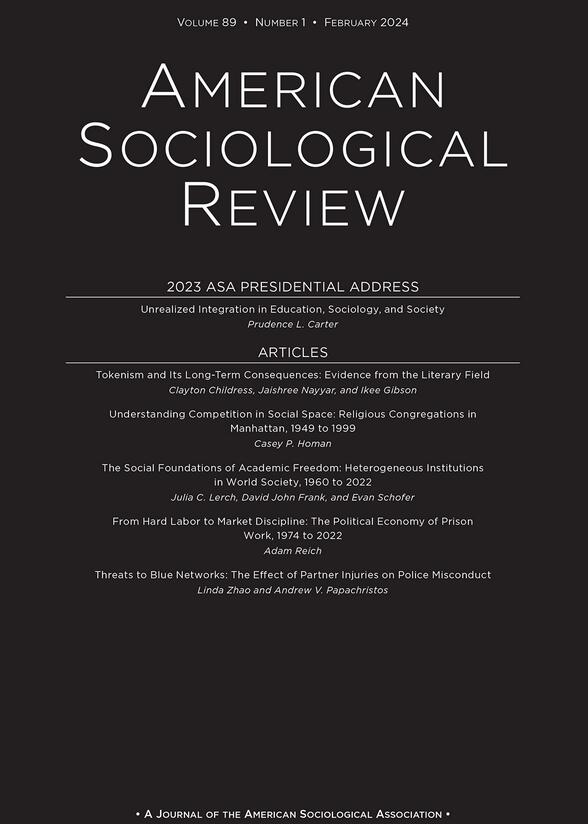拥抱市场自由主义?社区结构、嵌入性与股份公司的相互储蓄和贷款转换
IF 6.2
1区 社会学
Q1 SOCIOLOGY
引用次数: 0
摘要
将社区研究与经济和组织社会学相结合,我们分析了组织对市场化的反应是如何由其在社区中的嵌入性和这些社区的社会联想结构形成的。我们通过对美国储蓄和贷款协会(SLA)相互转换为股份公司的事件历史分析来解决这些关系,SLA是一个由储户所有的传统社区银行组成的群体,在20世纪70年代和80年代放松管制期间进行了股份化。与社会组织混乱和社会资本下降的说法一致,由于SLA在当地的嵌入程度越来越低,社区组织混乱,工作或跨阶级的联合性不断下降,SLA经理放弃了互惠互利的企业。然而,转变也取决于精英阶层的超然、公民重组、社区内部的分歧,以及帮助SLA管理者将SLA从主街重新定位到华尔街的“向上导向”协会。通过这项研究,我们超越了网络、机构和类别,将社区和地方协会添加到经济社会学的工具包中,以了解企业和市场的社会基础。我们展示了金融化如何将市场化的宏观层面政治制度动态与精英脱节、阶级和种族分裂以及公民重组的社区层面动态相结合,同时也揭示了相互合作形式的当代命运。本文章由计算机程序翻译,如有差异,请以英文原文为准。
Embracing Market Liberalism? Community Structure, Embeddedness, and Mutual Savings and Loan Conversions to Stock Corporations
Integrating research on communities with economic and organizational sociology, we analyze how organizations’ responses to marketization are shaped by their embeddedness in communities and the socio-associational structure of those communities. We address these relations via event-history analyses of mutual conversions to stock corporations among savings and loan associations (SLAs) in the United States, a population of depositor-owned and traditionally community-based banks that demutualized amid deregulation during the 1970s and 1980s. Consistent with accounts of social disorganization and declining social capital, SLA managers abandoned mutual for corporate enterprise as SLAs became less locally embedded, and where communities experienced disorganization and declining working- or cross-class associationalism. Yet conversions also depended on elite detachment, civic reorganization, bifurcation within communities, and “upwardly oriented” associations that helped SLA managers reorient SLAs from Main Street to Wall Street. Through this study, we look beyond networks, institutions, and categories to add communities and local associations to economic sociology’s toolkit for understanding the social foundations of firms and markets. We show how financialization coupled macro-level political-institutional dynamics of marketization with community-level dynamics of elite disconnection, class and ethno-racial fracture, and civic reorganization, while also shedding light on the contemporary fates of mutual and cooperative forms.
求助全文
通过发布文献求助,成功后即可免费获取论文全文。
去求助
来源期刊

American Sociological Review
SOCIOLOGY-
CiteScore
13.30
自引率
3.30%
发文量
35
期刊介绍:
The American Sociological Association (ASA) is a non-profit membership association established in 1905. Its mission is to advance sociology as a scientific discipline and profession that serves the public good. ASA is comprised of approximately 12,000 members including faculty members, researchers, practitioners, and students in the field of sociology. Roughly 20% of the members work in government, business, or non-profit organizations.
One of ASA's primary endeavors is the publication and dissemination of important sociological research. To this end, they founded the American Sociological Review (ASR) in 1936. ASR is the flagship journal of the association and publishes original works that are of general interest and contribute to the advancement of sociology. The journal seeks to publish new theoretical developments, research results that enhance our understanding of fundamental social processes, and significant methodological innovations. ASR welcomes submissions from all areas of sociology, placing an emphasis on exceptional quality.
Aside from ASR, ASA also publishes 14 professional journals and magazines. Additionally, they organize an annual meeting that attracts over 6,000 participants. ASA's membership consists of scholars, professionals, and students dedicated to the study and application of sociology in various domains of society.
 求助内容:
求助内容: 应助结果提醒方式:
应助结果提醒方式:


